I am very happy to be invited to give this investment talk. I am not a professional and after seeing so many professionals in the audience, I feel so humble. Please do not hesitate to point out anything that you do not agree with me so that we can discuss logically to reach an acceptable agreement. After I have completed my speech, please do not hesitate to ask me any question and I will try to answer all your questions. Even if I do not know the answers, I am sure some of the attendees have the answers.
How I started to invest?
About 150 years ago, The Chinese refused to buy opium from the British. As a result, the British gun boats attacked Shanghai. The Chinese lost in the opium war and had to surrender Hong Kong and part of Kowloon to the British Government.
I remember when I was a boy, the British had an opium sale outlet near my house along High Street KL. Hard to imagine that the British Government sold opium to all the people in all the British colonies at that time.
In 1983 when China gave notice to the British Government to recover the sovereignty of Hong Kong, the stock market crashed. Investors always over react on bad news. Many of the Hong Kong people were rushing to sell whatever they could because the communists were coming to replace the British. There were so many shares selling at ridiculously cheap prices.
During the cheap sale, I discovered a really under-price stock called Hong Kong Reality and Trust (HKRT) controlled by Willock Marden, a Jew. Just before, the bad news the company sold a multi storey building called Willock House and its account showed it had more than HK$10 cash per share.
The share was selling at HK$ 13.50 and during the crash, it was selling at HK$3.00 per share.
As a contractor, I was always prepared to take risk and I bought HKRT with all my available funds and margin finance. As soon as China extended the lease by another 50 years, the stock market rebounded sharply. The price for HKRT shot up to above HK$ 14.00 per share, a gain of more than 300% within 3 months.
Within 3 years, I made so much money that I bought 46% of a stock broking company called Kaiser Stocks and shares Co. Ltd.
As I found out this easier way of making money, I stopped working as an executive director of IJM Corporation Bhd. even though I was a co-founder. I became a non-executive director and fully retired when I reached 60 years old.
As I said, it was so easy to make money when the market crashed. I have to be brave and willing to take the risk. But it is not so easy to find good and cheap shares during normal time. After that period, I started reading the methods as practised by Peter Lynch, Benjamin Graham, Warren Buffett and Professor Glen Arnold who has written several investment books. The most famous book is called “Value Investing”.
Almost all the investment gurus were preaching value investing. After I tried value investing for some years, I found that it took too long to make money. For example, currently there are many undervalued property stocks selling below their NTA because there is an oversupply of unsold properties in every town and cities in Malaysia.
After I tried many other investing styles, I eventually formulated my golden rule for share selection which I will elaborate later.
1. to make money from the stock market, you must know how to select good shares to buy.
2. you must know when to sell
3. to maximise your profit you must know how to control your emotion of fear, greed, patience and bravery.
Share selection:
Among all the criteria such as NTA, dividend yield, healthy accounts, cash flow, EPS etc profit growth prospect is the most powerful catalyst to move share price. When you buy any stock, you expect to make money from dividend yield and share price increase. Almost all the Malaysian companies pay out very poor dividends. As a result, investors always look at the company’s profit growth.
Koon’s golden rule for share selection:
The company must report 2 consecutive quarters of increasing profit and the share is be selling at below P/E 10. For example
PCCS: PCCS reported EPS of 1.45, 2.17 and 3.57 sen per share in the last 3 quarters and the last traded price was 60 sen.
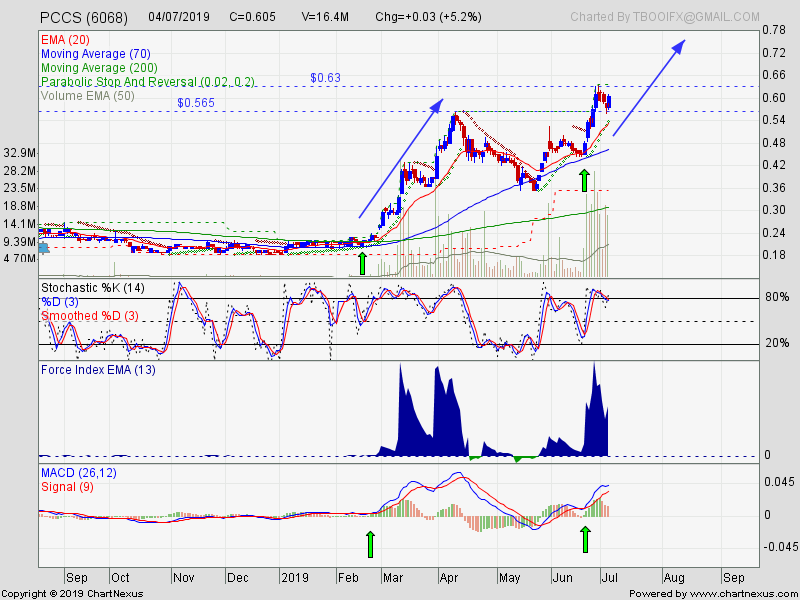
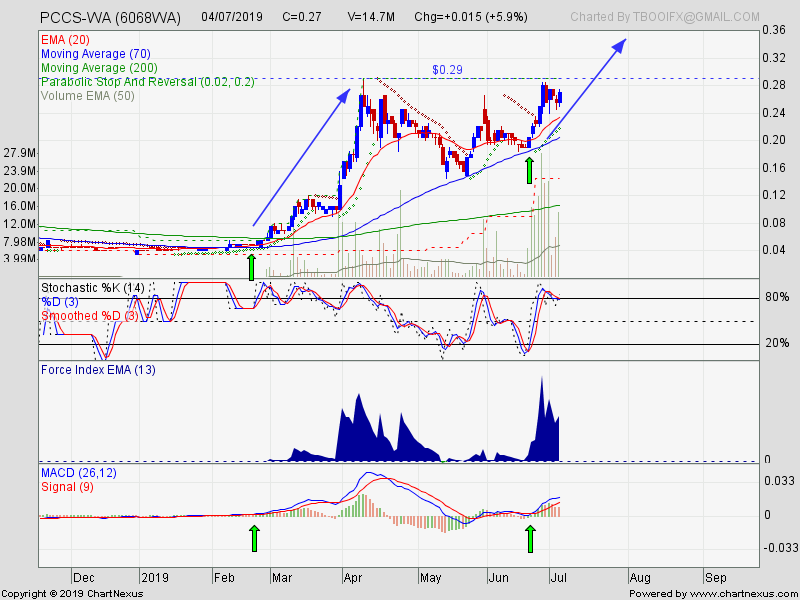
Advantage of buying warrants:
Usually the price of the warrant will go up or drop in tandem with the mother share. For example, the conversion price of PCCS warrant is 60 sen and its par value is Rm 1.00. Moreover, it is selling at less than half of the mother share price. Instead of buying 1 mother share, you can buy 2 warrants.
Teo Seng
Teo Seng reported EPS of 2.34, 5.76 and 7.37 sen per share in the last 3 quarters and the last traded price was Rm 1.24.
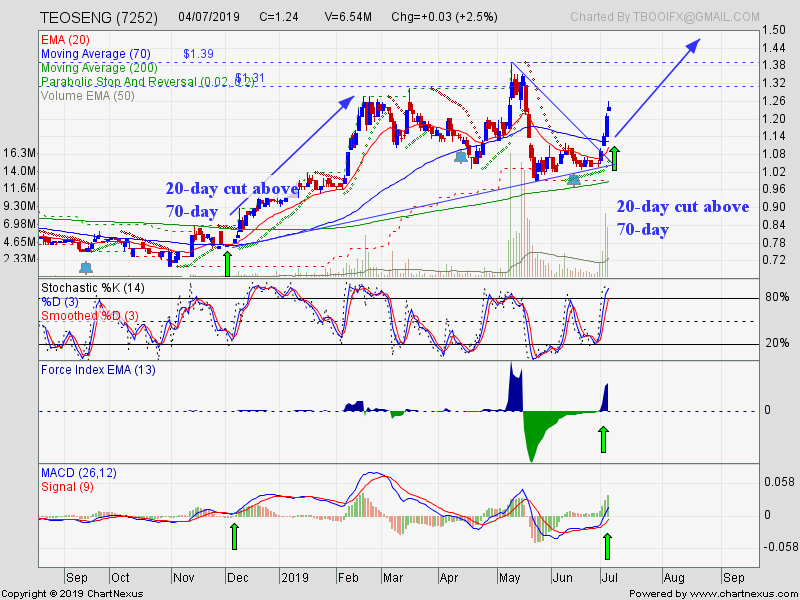
How to read price charts?
It is not possible to teach you the finer points of charting within the short period of time. But it sufficient to mention that never buy any stock when it is on the down trend because it will continue to drop. It is like catching a falling knife.
Always buy good growth stock when it is on the uptrend as shown of the charts for PCCS or Teo Seng. The price is like likely to go higher.
How I applied my golden rule to make a lot of money?
I have been using my share selection golden rule successfully to buy the following stocks:
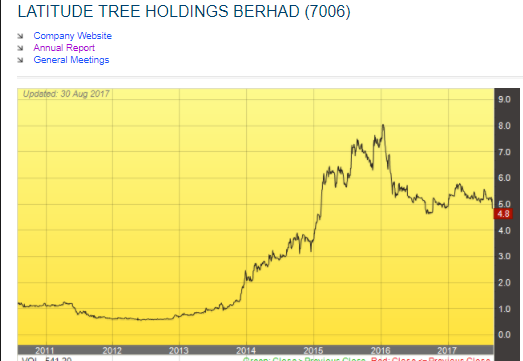
The above chart shows that Latitude went up from Rm 1.00 to Rm 8.00, an increase of 800 % within 2.5 years. Its 2015 annual report showed that I was the 4th largest shareholder holding 6.32 million shares.
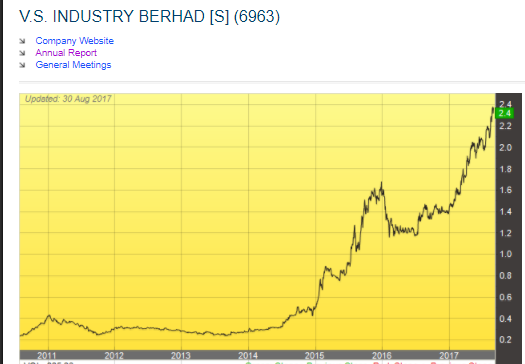
The above chart shows V S Industry went up from 30 sen in June 2014 to Rm 1.70 in Dec 2016, an increase of 550 % within 18 months. Its 2015 annual report showed that I was the 2nd largest shareholder, holding 102 million shares.
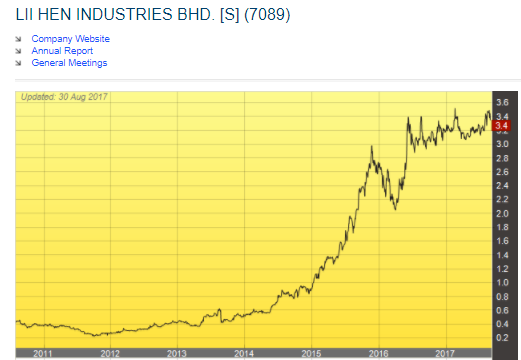
The above chart shows that Lii Hen went up from 40 sen in mid 2013 to Rm 3.00 in Oct 2015, an increase of 750% within 2,5 years. Its 2015 annual report showed that I was the 2nd largest shareholder, holding 19.80 million shares.
My most expensive mistake when I ignored my golden rule for share selection:
About 2 years ago, I ignored my golden rule and bought too many Jaks shares using margin finance. I focused on Jaks’ lucrative contract to construct a huge coal fired power to generate electricity for sale to the Vietnamese government for 25 years. Moreover, Jaks had sub-contracted the whole project to the Chinese who have built most of the power plant in China. Jaks was sure to make huge profit every year for 25 years.
Due to this good news, the share price went up to above Rm 1.70 per share. But at the meantime, the company is suffering losses due to its huge debts and depressed property market. Moreover, The Star was suing for Rm 50 million for late completion of its contract to build the Star’s building.
Due to this bad news, the share price tumbled and I had margin call. I was forced to sell some of my holdings. The more I sold, the more the price fell and the more I was forced to sell. Forced sell is a vicious cycle. Finally, I lost Rm 64 million.
Margin finance
To leverage your profit, you can use margin finance to buy more shares. Margin finance is a double edge sword. It cuts both ways. Your profit will be increased when the share price goes up. But you will increase your losses if the share price drops. Margin finance is only for investors who have experience.
When to sell?
You must remember that every share cannot continuously go up or drop for whatever reason. After some time, it will correct its moving trend. However, you must remember that if the company has very strong earning potential, the price will soon go up higher and higher again. You can sell some during price correction so that you have funds to buy back at lower prices.
You must bear in mind that some products or services are affected by season. For example, more eggs are sold during festive days.
Another example, Dayang’s service is affected during monsoon period 1st quarter of the year. Unfortunately, many shareholders dumped their holdings as soon as they saw Dayang reported a small loss in the last quarter. Fortunately, it has been going up in the last few days. It shot up 8 sen yesterday, 7 July 2019.
Control of emotion: Fear, greed, patience and bravery
Fear:
When you buy any stock, you expect to gain from its dividend and share price increase. Almost all the Malaysian listed companies pay out poor dividend. You must always aim for share price increase.
Some people cannot control their fear to buy any good stock which complies with my golden rule for share selection. They prefer to buy very safe stocks like Public Bank which give out about 4% a year.
Greed:
Some investors are very greedy. They often fall in love with their purchases and they would not sell any of their holdings even it has shot through the roof. As I said before, no share can continuously go up. Unless you sell you cannot make money and you do not have funds to buy back at cheaper prices.
Patience:
They say patience is the key to successful investment and also to accomplish anything. The daily price difference for any stock on any trading day is a few sens. If you are patient, you can always buy at cheaper prices or sell at higher prices.
Bravery:
They say a faint heart will not win a fair lady. Sometime, when you have discovered a growth stock that complies with my golden rule for share selection, you must not hesitate to buy.
Important points to remember:
Initial Public Offer: Statistics shows that most of the profit projections are not achievable. That is why I do not buy IPO shares.
Finance Institutional recommendations: Always read their recommendations with a pinch of salt. You must remember, the writer interviews the company’s CEO of CFO who would always say that they can do this or that. In most cases, all their projections are not achievable. The CEO or CFO will never say that their company has no more future profit growth.
Moreover, the financial institutions might have already bought them at much cheaper prices and they want to encourage readers to buy their holdings.
Politics and world affairs: Financial institutions and big investors are constantly worried about the current US- China trade war and our current political affairs such as our former PM Najib stolen billions of Ringgits and our country is in bad shape. As a result, they are reluctant to invest in our stock market and share prices are generally depressed. We should take advantage of the situation.
As we are comparatively small investors, we should not be afraid to buy if we have found some really good growth stocks, although the overall market is depressed. There are about 1,100 list companies and we are only interested in a few stocks.
General behaviour of investors:
In the stock market, investors always over react to good or bad news. Many investors would rush to buy on hearing some good news, even when the price has shot through the roof. Counterrally, many investors would rush to sell on hearing some bad news.
